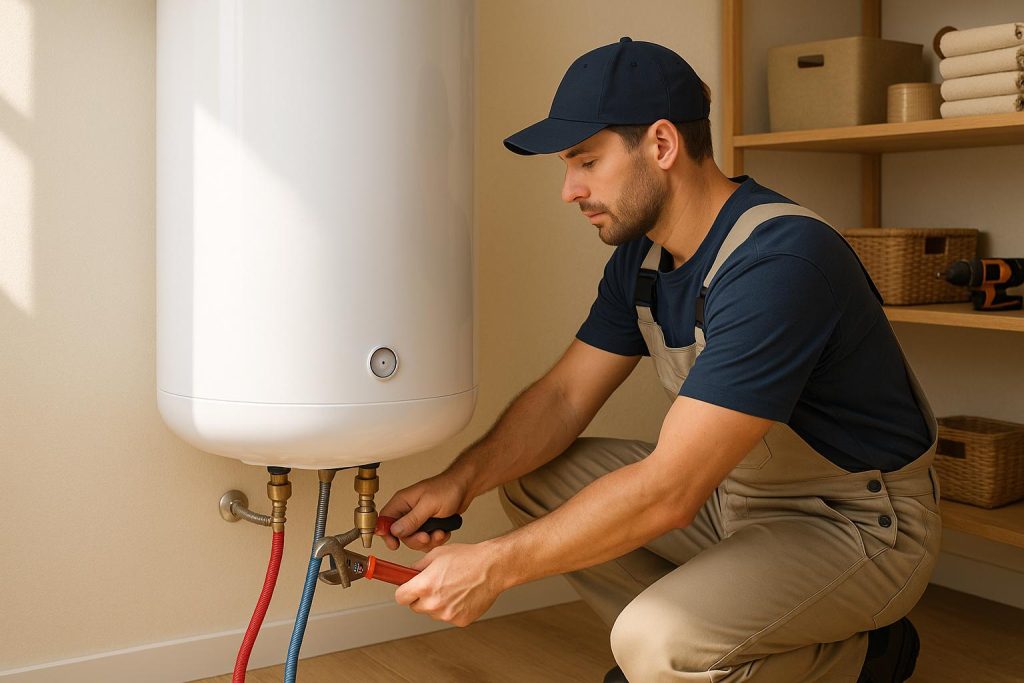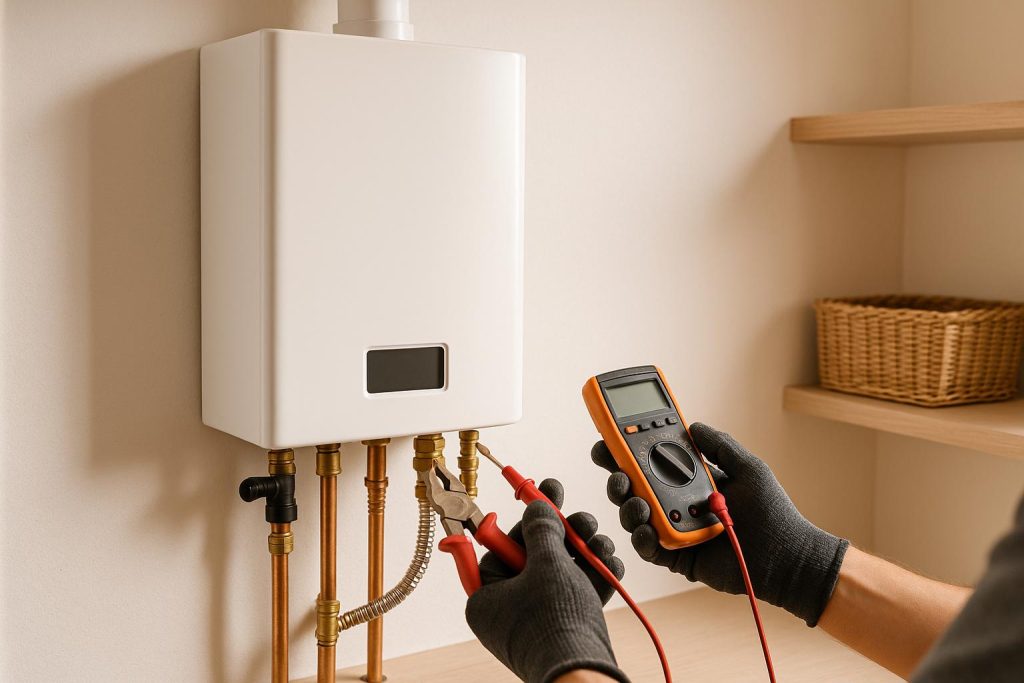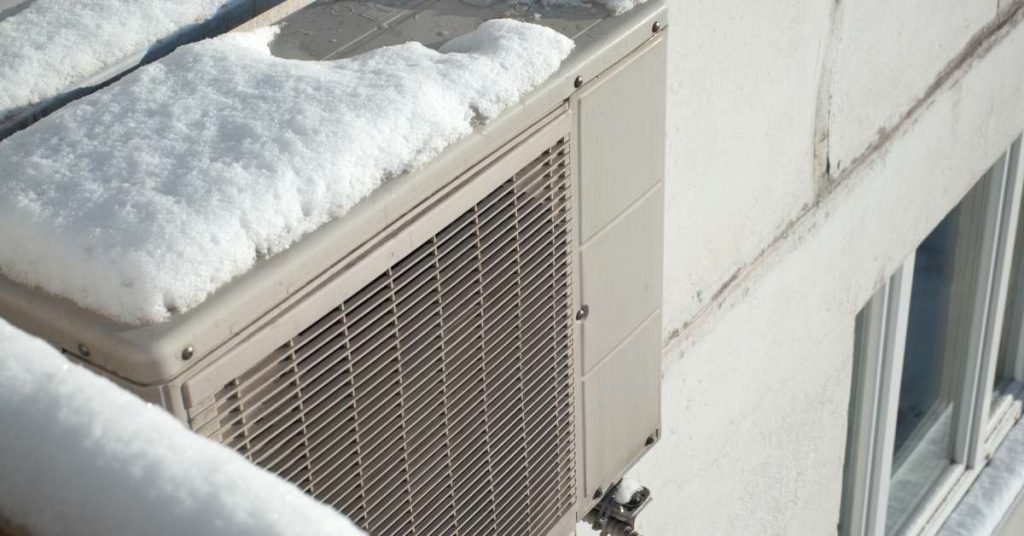
A frozen air conditioning (AC) unit is a common issue that can disrupt cooling, reduce efficiency, and potentially damage the system. Understanding the reasons behind your AC unit freezing up and knowing how to address them is essential for maintaining your cooling system. Here’s a summary of common causes and what to do when your AC unit freezes up:
Causes of AC Unit Freezing
- Low Refrigerant Levels: Insufficient refrigerant in the AC system can cause the evaporator coils to become too cold, leading to ice formation.
- Poor Airflow: Reduced airflow due to dirty or clogged air filters, blocked vents, or malfunctioning fans can cause the coils to get too cold and freeze.
- Thermostat Issues: Incorrect thermostat settings, a malfunctioning thermostat, or a continuously running system can lead to overly cold evaporator coils and ice formation.
- Refrigerant Leaks: Refrigerant leaks not only result in low refrigerant levels but can also disrupt the temperature balance within the system, causing the coils to freeze.
What to Do When Your AC Unit Freezes Up:
- Turn Off the AC: If you notice ice on your AC unit, turn off the system immediately to prevent further damage.
- Let it Thaw: Allow the ice to melt naturally. Do not attempt to chip away the ice, as this can damage components.
- Check Airflow: Inspect and clean or replace air filters to ensure proper airflow. Remove any obstructions or blockages from vents and registers.
- Adjust Thermostat Settings: Review thermostat settings and avoid setting it too low, which can lead to prolonged AC operation and freezing.
- Professional Inspection: Contact a qualified HVAC technician to diagnose and address the root cause of the issue. They can check for refrigerant leaks, assess the condition of the evaporator coils, and ensure the system is functioning correctly.
- Regular Maintenance: To prevent future freezing, schedule regular AC maintenance, including cleaning coils, checking refrigerant levels, and maintaining proper airflow.
How an Air Conditioner Works

To understand how and why your AC unit is freezing up, I believe it is important for you to understand how an air conditioner works. Although I will explain it using central air, it is the same concept for other types of air conditioners as well.
An air conditioner is made up of 3 main components:
- Evaporator coil
- Compressor
- Condenser coil
It also has a vital component known as an expansion valve. A refrigerant (Freon/Puron) is circulated between the 3 components where it effects heat exchange by changing from gas to liquid and gas again.
The evaporator coil is located inside the house. As the refrigerant (at that time a very cold liquid) is moving through the coil, a fan/blower pulls warm air from the house through the return air ducts and forces it over the coil.
The refrigerant absorbs heat from the indoor air and that is how the air is cooled. Cooled air is then forced out and into the house via the supply air ducts.
At the same time, the refrigerant changes to its gaseous state and is ejected out of the evaporator coil to the compressor. Inside the compressor, its pressure is increased, which also increases its temperature.
The increase in temperature, relative to the outside temperature allows it to eject the heat it absorbed indoors to the outdoors, inside the condenser coil.
From the compressor the refrigerant enters the condenser coil. Both the condenser coil and compressor are located outside the house to form what is known as the outside unit.

As the refrigerant moves through the condenser coil, a fan blows cooler air across it. The air absorbs heat from the refrigerant and disperses it to the surrounding.
By the time the refrigerant is exiting the condenser coil it will have lost so much heat that it will have turned back to its liquid state.
Although the refrigerant will be already in its liquid state, it is still not cold enough. And that is where the expansion valve comes in.
The expansion valve is a small restriction which reduces the pressure of the refrigerant. Reducing the pressure of the refrigerant also causes its temperature to fall drastically.
When the refrigerant goes through the valve, it expands. In thermodynamics, when a fluid expands, its pressure reduces and its temperature also reduces. When fluids are compressed, their pressure and temperature increases.
After passing through the expansion valve, the refrigerant is then ready to enter the evaporator coil for another round of cooling.
Why Your Air Conditioner Unit is Freezing Up

Your air conditioner unit will freeze if the process I have outline above is affected, causing the refrigerant temperature to fall below freezing point.
The following are some of the causes of a freezing AC unit:
1. Blocked/Leaking Air Ducts
Your HVAC system has 2 sets of air ducts:
- Return air ducts
- Supply air ducts
Return air ducts bring hot air from the house to the evaporator coil while supply air ducts carry cooled air from the evaporator coil to the house.
An AC unit is sized in accordance to the house. That is usually to prevent undercooling or overcooling. The evaporator coil is therefore designed to keep cooling a certain amount of air using a certain amount of refrigerant.
When the flow of warm air to the evaporator coil is inhibited by a blockage inside the ductwork, the refrigerant has less air to cool and therefore keeps on expanding, meaning its temperature keeps falling.
Even though less air is being delivered to the evaporator, the compressor keeps working normally which is what accelerates the freezing up.
It is also good to remember that liquid refrigerant cannot leave the evaporator coil and enter the compressor. The expansion valve apart from lowering the pressure of the refrigerant also monitors the temperature of refrigerant leaving the evaporator coil to prevent the compressor from getting damaged.
That means that the very cold refrigerant just stays inside the evaporator coil and that is how it results in the freezing of the unit.
2. Clogged Air Filter
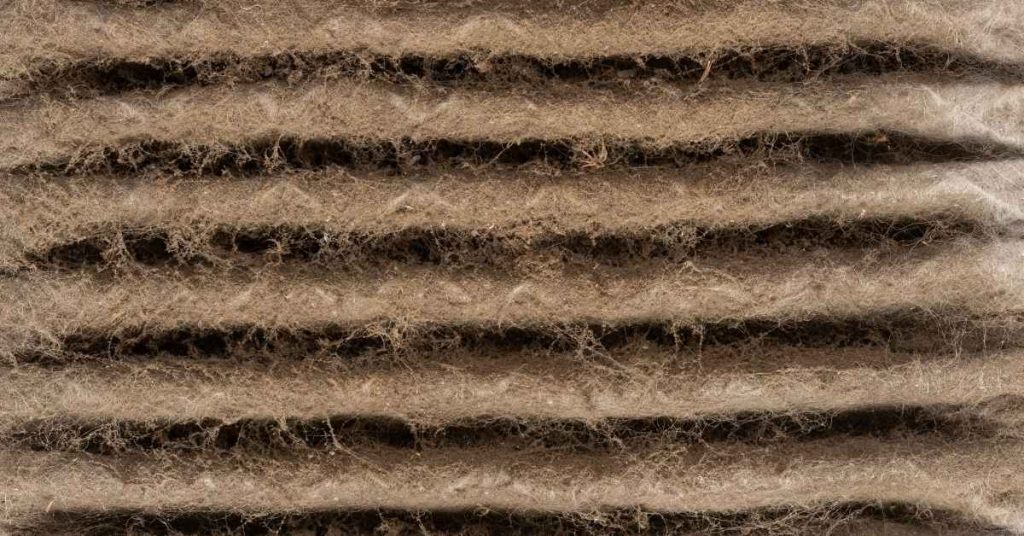
An air conditioner is fitted with an air filter which is usually located in the system’s return air duct. The air filter is designed to remove dust, lint, pollen, dander, hair, fur and other impurities from the return air, preventing them from clogging the coil and basically cleaning the indoor air.
Air filters are however not permanent. Ideally, an air filters should be changed after every 1 to 3 months depending on the number of people and pets in the house.
Failure to change your AC filter will have it badly clogged, which will restrict the flow of air to the evaporator coil. Although the fan will work extra harder to pull air through the dirty filter, there will still be reduced airflow to the coil.
As we have already seen, a reduction in warm airflow to the evaporator coil will result in the freezing of the AC unit as the refrigerant temperature will fall below freezing point.
If apart from your air conditioner freezing up you have noticed an increase in energy bills and you have not changed your AC filter for some time, you will need to locate and replace the filter. That is most likely the source of your problem.
The increase in energy bills is caused by the fan working extra hard trying to pull air through the dirty filter.
3. Low Refrigerant Levels
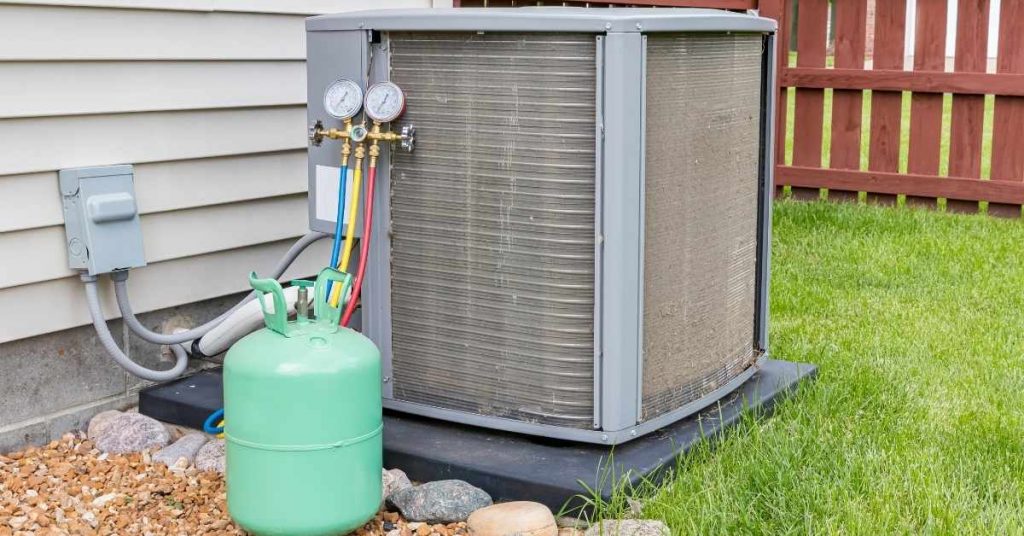
As I have already mentioned, it is actually the refrigerant that effects heat exchange both in the evaporator coil and condenser coil. It is therefore critical to have good levels/pressure of the refrigerant.
By now, you already know that there is a special relationship between the pressure and temperature of the refrigerant. When there is lower than normal levels of the refrigerant in the system, it also means that its pressure will be low as well.
I mentioned that when the refrigerant is expanded (by lowering its pressure) its temperature reduces as well. That is how AC units freeze when the refrigerant levels are low.
In a normal operating AC unit, the temperature of the refrigerant at the point entry (in the evaporator coil) is 32 degrees. When that is the case, the moisture in the air condenses and drains away easily.
When the refrigerant levels are low, the temperature of the refrigerant at the evaporator coil entry will be lower than 32 degrees (freezing point of water). Because the evaporator coil will be so cold, the condensate will freeze.
Ice will keep on building up on the coil, restricting the flow of air through it. As a result, the refrigerant cannot absorb heat from the indoor air. This process continues until the entire coil is a block of ice.
The freezing works its way back to the outside unit through the suction line. Unless the problem is fixed, liquid refrigerant can flow back to the compressor and damage it.
4. Faulty Blower/Fan
A blower/fan is responsible for pulling warm air from the house and forcing it across the evaporator coil. The fan increases the rate of heat exchange between the indoor air and the refrigerant.
If you have a damaged/faulty fan, it will not move enough air across the evaporator coil causing the refrigerant temperature to fall below freezing point of water.
As we have seen, that is when ice starts to form on the evaporator coil. Of course a damaged fan also means a reduction in the cooled air being delivered to the house.
A faulty blower should be fixed or replaced by a qualified HVAC technician.
5. Clogged Condensate Drain Line
Apart from removing heat from your indoor air, your air conditioner is also responsible for lowering the humidity levels in your house. In simple terms, humidity is the amount of water vapor in the air.
When the hot and humid indoor air comes into contact with the cold evaporator coil, the water vapor condenses into a liquid and is removed out through the condensate drain line.
If the condensate drain line is clogged the drip tray will fill and start to overflow. Due to how cold the evaporator coil is, the condensate will freeze and unless the issue is fixed promptly, the whole coil will soon be covered in ice.
6. Dirty Evaporator Coil

Although your AC unit is fitted with an air filter, not all of the dirt is trapped by the filter. Some of it will still move passed it.
The dirt is trapped and cakes on the coil’s fins, which restrict the flow of air to the coil. A reduction in airflow to the evaporator coil will result in freezing up.
Apart from changing your air filter regularly, you should also have the evaporator coil cleaned regularly to prevent dirty from restricting airflow to the coil.
7. Low Night Temperatures
It is not unusual to have cool night temperatures during the months of summer. That can also cause your AC to freeze up.
You see, air conditioners are programmed to operate within a certain temperature range. When the temperatures drop below that range, the refrigerant levels inside the AC unit can also fall and as we have already seen, a reduction in pressure means a reduction in temperature.
And when the temperature reduces, the moisture will start freezing on the evaporator coil. If your AC unit freezes up at night, this could very likely be the cause of your problem.
What to Do When Your AC Unit Freezes Up?

So, how do you unfreeze an air conditioner as fast as possible?
You should avoid using your air conditioner when it is frozen. Doing so will only strain both the compressor and fan/blower and will not help the ice to melt away.
The first thing you should do is turn off the air conditioner and let the ice to start thawing. No matter how hot it is, don’t turn on the AC until all the ice has melted, but you can open doors and windows for ventilation.
The time taken for the ice to thaw completely depends on the extent of the ice buildup. Sometimes it can take 1 to 3 hours while in some cases it can take up to 24 hours or even longer.
Avoid the temptation to break the ice by use of a heavy object. That can damage some AC components resulting in more expensive repairs.
After all the ice has melted away, the next step is to dry the evaporator coils. For this you can use paper towels or let it dry naturally, especially if in direct access to sunlight.
Turn on the HVAC system but set the thermostat so that it only runs the fan or blower. That will help in air circulation which will in turn completely dry the coil.
After that the AC system should run normally again.
How to Prevent an Air Conditioner from Freezing
To prevent your AC from freezing, the following will help:
1. Change the Air Filter Regularly
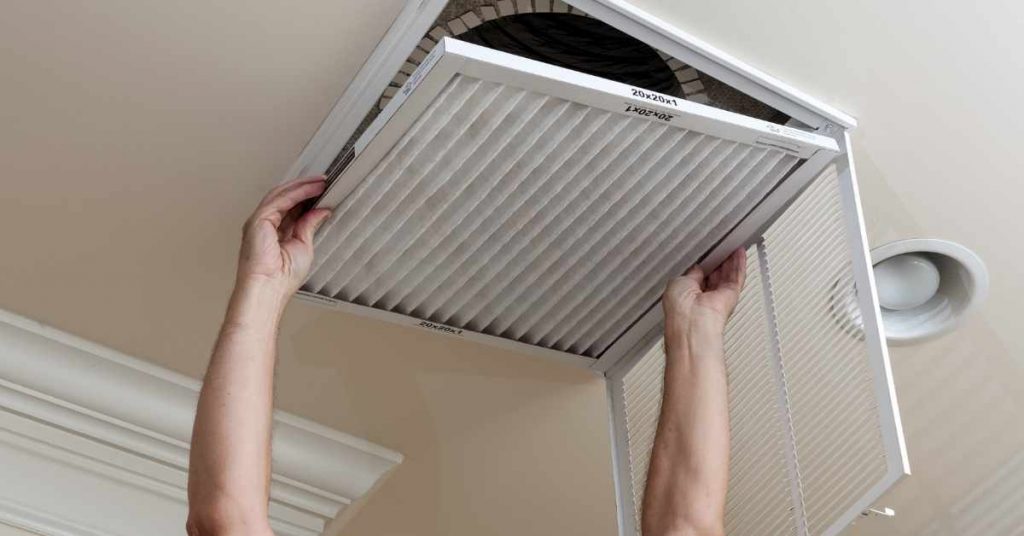
An air filter for an AC unit should be changed after 90 days or sooner. A clean filter will not only improve your system’s efficiency but it will also clean your indoor air and prevent your unit from freezing.
2. Schedule Regular Maintenance
You do not have to wait until your air conditioning system is faulty in order to call a technician. Treat your HVAC system the way you treat your car.
Have a qualified technician come over after every few months to check the refrigerant levels, inspect and clean the ductwork, clean the coils, inspect the condensate drain line, inspect the motors and fans and other parts.
That way, any potential problem will be taken care of before it gets out of control.
3. Check Weather Forecast
As we have seen, an air conditioners can freeze when outdoor temperatures dip at night. You should therefore stay on top of things by checking the forecasted weather for the day/week.
If the weather is expected to dip, the best thing is to turn off your AC. Not only will that prevent it from freezing, it will also lower your energy bills.
Another thing you can do is to have a programmable thermostat installed. A programmable thermostat will turn off the AC when temperatures falls below 60 degrees (or any other set temperature).
Wrap Up
And basically that is why your air conditioning unit is freezing up. As you can see, although a freezing AC unit is normal, it is totally avoidable. A frozen AC is very frustrating and that is why you should make sure it never happens.


